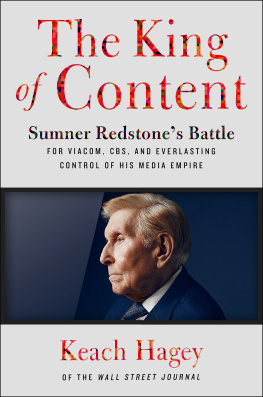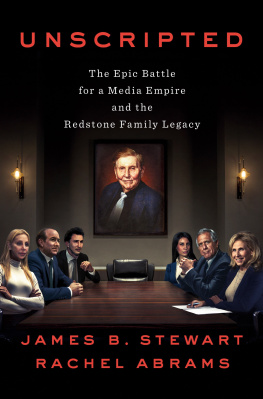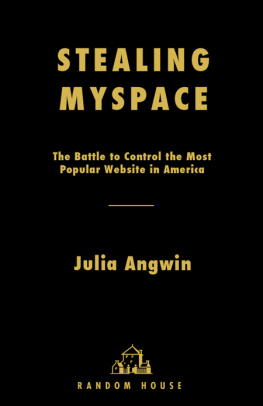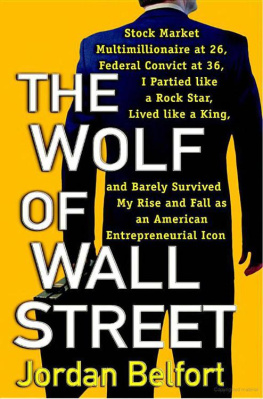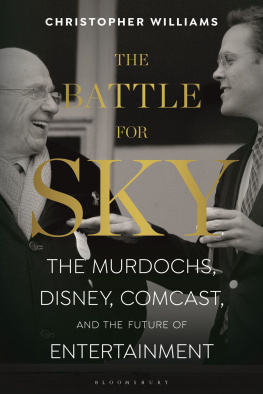
Sumner Redstone with his daughter, Shari, in 2012. By 2018, Shari had ascended to the top of her familys empire, becoming a media mogul in her own right. (Mark Sullivan/WireImage/Getty Images)
One afternoon in February 2016, Viacom chief executive Philippe Dauman drove through the heavy metal gates of the exclusive Beverly Park neighborhood overlooking Beverly Hills, past the Olympian estates of movie stars like Sylvester Stallone and Eddie Murphy, and up to the sprawling, butter-colored mansion of his longtime boss and mentor, Sumner Redstone. Such visits had long been a monthly routine for the lifelong Manhattanite, who ran the New Yorkbased public company that the ninety-two-year-old Sumner overwhelmingly controlled. Usually the two former lawyers would mix business talk with reminiscences of their past corporate conquests, watch a little baseball or CNBC, and gaze at the giant aquariums of Sumners beloved saltwater fish.
But on this day, Dauman had come to discuss a particularly delicate matter. Viacom was considering selling nearly half of Paramount Pictures, the glamorous Hollywood studio whose takeover in 1994 had defined both mens careers. They had wrested it from rival media titans Barry Diller and John Malone in an epic bidding war, and owning Americas oldest continuously running studiothe home of The Godfather, Chinatown, and the Indiana Jones serieshad cemented Sumners status as a mogul.
Yet Viacoms stock had been in a tailspin, losing half its value during the previous two years, and investors were clamoring for some kind of dramatic action. Some big Chinese companies had gotten Hollywoods attention in the last few months with their interest in studios, and it seemed like a good moment to capitalize on the century-old Paramounts romantic allureeven if it, too, had been in a years-long slump. After one prospective buyer expressed interest in a deal that valued the beleaguered studio at more than $10 billionmore than twice what most analysts thought it was worthDauman wanted to explore a joint venture. Perhaps the right partner could not only provide the cash Paramount desperately needed to restock its nearly bare cupboard of franchises but also help the studios movies get better access to international markets in an era when 70 percent of Hollywoods movie revenues came from overseas.
He knew it would be a hard pitch. Redstone was an amasser, not a divester, and few things had brought him greater pleasure over the last two decades than his intimate dinners at Dan Tanas or The Ivy with Paramounts management, albeit often at the inelegantly geriatric hour of five p.m. To own a studio in Hollywood was to be a king, a status beyond money. And Paramount was not just any studio. It was the original Hollywood monopoly, the creator of the studio system business model and the first studio to take Sumner seriously when he was nothing more than the executive vice president of his fathers drive-in theater chain.
Daumans task would also be challenging because communication with Sumner these days was nearly impossible. The mogul who had once famously declared that Viacom is me had suffered a precipitous decline in his health in eerie parallel with Viacoms stock price, after an episode of inhaling food into his lungs in 2014 that had left him dependent on a feeding tube and barely able to speak. A few months earlier, his former live-in companion had alleged he was completely non compos mentis, unable to follow the thread of a conversation or the plot of a film. And a few months after this visit, Dauman himself would make a similar charge. But for now, he tried to communicate with Sumner the way he had been for months, by doing his best to interpret his grunts.
Often, visitors to the mansion got help deciphering Sumners speech from his nurse Jeremy Jagiello, dubbed the Sumner whisperer. But Daumans task was too sensitive for that. For months, he had assumed that the mansion was either bugged or filled with spies loyal to his longtime rival, Sumners daughter, Shari Redstone. Shari and Dauman, both sixty-one, had long competed for the role of Sumners heir apparent, but in recent years, Dauman seemed to have definitively clinched the prize as Sharis relationship with her father deteriorated. That had all changed since the fall, however, when the two live-in companions half Sumners age to whom the mogul had bequeathed some $150 million (whom Shari referred to as her fathers little sluts) were thrown out of the mansion, paving the way for Shari to reconcile with her father. Dauman had been concerned enough about Shari that he had announced his visit when he was just twenty minutes away, in order to avoid giving his East Coast rival enough time to get on a plane and position herself next to her father through their meeting, just as Sumners former companions had done with all of Sumners visitors during the two years before their ejection. Still, he assumedcorrectlythat anything Jagiello heard would be relayed back to Shari.
So as he walked in to find Sumner watching television in the fish room, the sitting room lined with aquarium-scale fish tanks, he asked Jagiello if he could step into the next room so that he and Sumner could discuss some sensitive corporate information. The nurses were not allowed to let Sumner out of their sight, in case they had to jump in and suction from his throat the saliva that was constantly threatening to choke him, but Jagiello moved through the open doorway between the aquariums. Dauman pulled a chair up next to Sumner, so that Jagiello could only see his back, and leaned in close to whisper his news. He asked Sumner if he had understood him, and Sumner nodded.
A few days later, Dauman held a board call to discuss the Paramount stake sale. Worried about leaks, he had not told anyone in advance, not even Paramount chairman Brad Grey, what the call was about. As he had expected, Jagiello had told Shari about the visit, the whispering and the nodding, and she called Dauman repeatedly in the hours leading up to the board call, worried about what machinations her rival was up to. But the call itself proceeded without drama. Dauman addressed the board members one by one, including Sumner and Shari, and got no objection from any of them.
The next day, Dauman announced that Viacom had received indications of interest from potential partners seeking a strategic investment in Paramount and had decided to pursue the discussions. In case any other potential partners were out there, the press release touted the studios deep library, robust pipeline with proven franchises, and high potential (read: nascent) television production operation. An undeniable For Sale sign had been planted in front of Paramounts iconic Spanish Gate.
Anyone familiar with Sumners history was stunned. He was famously fickle about his executives, but Paramount was the love of his life. And, indeed, within a few days of the announcement, Sumner began repeating I dont want to sell Paramount to anyone who would listento household staff, to Dauman over the phone, and finally, on Saturday, February 27, the day before the Oscars, to Grey, who wasnt so thrilled about the idea himself. Still, at the next board meeting, which Sumner dialed into remotely, he voiced no opposition, and management charged ahead with the plan. Sumners protestations would not become public until April 11, when they were reported in the Wall Street Journal.
Just how he came to utter this phrase is a matter of some dispute. Some people close to Viacom believe his household staff or some other ally of Sharis goaded him into saying it by misinforming him that Viacom planned to sell the entire studio. Others think he was coached to repeat the phrase the way he repeated, parrot-like, other phrases like Manuela is a fucking bitch or I kicked Shari out of the house by people close to him who had an interest in having him say those things. Still others argue this was his own, authentic opinion.

